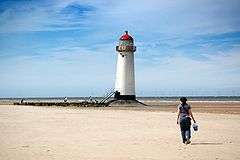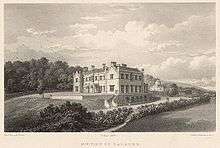Talacre
| Talacre | |
 The beach at Talacre |
|
 Talacre |
|
| OS grid reference | SJ122846 |
|---|---|
| Principal area | Flintshire |
| Country | Wales |
| Sovereign state | United Kingdom |
| Post town | HOLYWELL |
| Postcode district | CH8 |
| Dialling code | 01745 |
| Police | North Wales |
| Fire | North Wales |
| Ambulance | Welsh |
| EU Parliament | Wales |
| UK Parliament | Delyn |
| Welsh Assembly | Delyn |
|
|
Coordinates: 53°21′04″N 3°19′09″W / 53.35117°N 3.31911°W
Talacre is a village in Flintshire on the north coast of Wales in the community of Llanasa.
It is near Point of Ayr on the west side of the River Dee estuary and has a sandy beach with dunes with large holiday caravan parks adjacent. The hills of the Clwydian Range behind the village form the eastern boundary of the Vale of Clwyd. The name Talacre is a combination of the Welsh words tal, meaning end, and acrau, meaning acres. In the north-east Welsh dialect, acrau is pronounced as acre. According to other sources, the name is properly pronounced Tal-AK-ray or Tal-AK-ree.[1][2]

The village is probably most popular for the lighthouse on the nearby beach and the Talacre Beach Holiday Home Park, a short walk away from the Presthaven Sands holiday park. The lighthouse has been noted for numerous ghostly sightings, people claiming to see a figure wearing old fashioned lighthouse keeper clothes and standing in front of the glass dome of the abandoned lighthouse.[3] The lighthouse was featured in popular British television drama Skins, in the episode Skins Pure.
Talacre was used by the military during the Second World War, as an aircraft firing range. Fighters flew over the remote village every day, shooting at wooden targets in the dunes and at drogues towed by aircraft. It was also used for testing new devices, such as 'window' the anti-radar foil that, on occasion, covered the whole village with silver.
The village is often used as part of Paul O'Grady's comedy act, telling stories of how he spent many summers "Stuck in a four berth caravan in Talacre", and is therefore now part of popular culture as a famous "typically British" seaside holiday resort.
Talacre Abbey (Westbury Castle)

The Talacre estate (Talacre Abbey) and Talacre Hall, built in 1829, were the home of the Mostyn baronets of Talacre. The Carmelite Margaret Mostyn grew up on the estate in the early 1600s. In 1919 the Mostyn family sold the estate by auction and in 1921 it was occupied by a community of Benedictine nuns, who moved out in 1988.[5] The main hall, a grade II* listed building, now functions as a private house again, but renamed Westbury Castle.
Railways
Previously served by Talacre railway station which is currently closed on the North Wales Coast Line.
References
| Wikimedia Commons has media related to Talacre. |
- ↑ Wells, J C (2016). Sounds Fascinating: Further Observations on English Phonetics and Phonology. Cambridge University Press. p. 51. ISBN 978-1-107-15779-8.
- ↑ "Historic Statement - Talacre Hall" (PDF). www.flintshire.gov.uk. Flintshire County Council. Retrieved 23 September 2016.
- ↑ "Permanent 'ghost' for lighthouse". BBC News. 5 August 2009. Retrieved 2009-08-05.
- ↑ "Mostyn of Talacre manuscripts". Flintshire Record Office.
A noble castellated stone built mansion, containing 40 rooms, with a handsome private chapel
- ↑ "English Benedictine Congregation". Retrieved 20 July 2013.